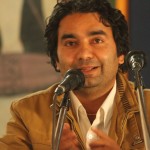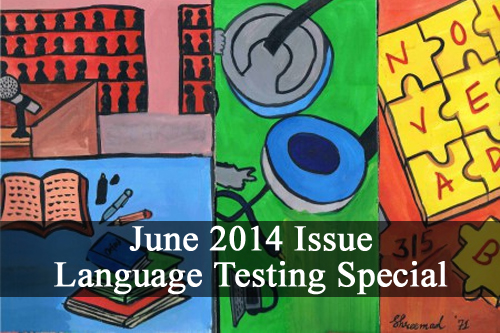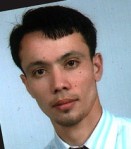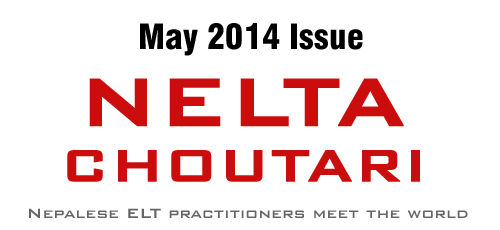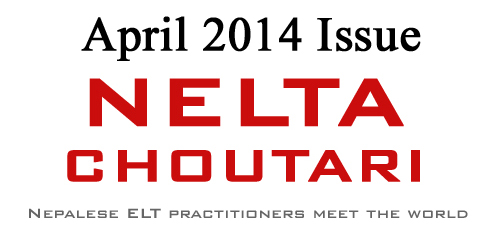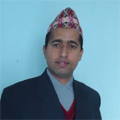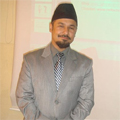Bal Ram Adhikari
When we think about the beginning of a new year, we’re referring to the cycle of seasons changing for that many times on a particular calendar (in this case, the Gregorian calendar). In that sense, the marker of 2014 is a mere social construct. However, we do make milestones with passing years in our collective consciousness. At this blog magazine, as we bid farewell to the year 2013 and welcome the year 2014, we hope to invite many more of our professional colleagues under the shade of a tree that is growing taller and bigger and its platform widening farther. We invite you to a platform where we will strive to connect the global and local realities in ELT, to bring about positive changes in ourselves and in our field! As we make this leap, I would like to relate Choutari’s vision with relevant scholarship in our field.
Expressing his discontent with the conventional trend of Applied Linguistics and thus appealing for transformation in the field, Pennycook (2004) proposed four types of responsibility on the part of the Applied Linguistic practitioners. They are ethical, political, intellectual, and social and cultural. In the paper entitled Restructuring Applied Linguistics for the Welfare of the Society (2012), we (Sajan Kumar and I) proposed the addition of the creative responsibility to Pennycook’s list. To escape these responsibilities is to fall into the trap of academic hypocrisies is the crux of Pennycook’s argument. The appealing element in Pennycook’s argument is his call for the transformation in the field without which one cannot fulfill the above mentioned professional responsibilities. We, teachers are supposed to bear all of these responsibilities and also many more. This calls for transformation, probably the most sought for and cherished concept in all fields, variously known as energy and transformation (Krishnamurti, 1972), quantum leap (Osho, 2001) in the field of philosophy, paradigm shift (Kuhn, 1962), New Physics (Capra, 1975) in the field of science. Likewise, the field of language pedagogy is replete with such terms as the postmethod condition (Kumaravadivelu, 1994), innovation (Markeee, 1997), culture specific-pedagogy and so on to mean transformation. Whatever the terms employed, the essence underlying them is the call for revisiting the field in question and showing a live response to everyday practice in order to bring out the positive change. I’d like to relate the thread of transformation to Nepalese ELT and to extend the thread to the long-term goal of our Choutari.
Our goal is transformation. The appeal for transformation lies at the heart of all post-realities (i.e. poststructuralism, postmodernism, postcolonialism, postcommunism, postmethod pedagogy and so on). I believe that the craving for transformation in various academic disciplines has its origin in the notion of the paradigm shift as hypothesized by American philosopher and historian of science Thomas S. Kuhn in his seminal work The Structures of Scientific Revolutions (1962), and the Derridan notion of deconstruction (1967). The post-realities bubbled to the surface most vigorously in the 1990s. We can speculate on a multitude of causes. I leave them untouched here for the constraint of the space and the nature of this writing. However, I cannot help mentioning the dismantling of Berlin Wall on 9th of November, 1989, and the collapse of the USSR in 1991. These two vital political events opened the window to the free world, “one where every human being would be free to realize his or her potential” (Friedman, 2006, p. 607). These events were coincided with the end of the Panchayat era resulting in the re-establishment of democracy in Nepal in 1990. English language teaching as a globally booming profession could not remain untouched from these changes and new realities in academic and political fields at home and abroad. The 1990s is also remarkable for the booming of ‘the dot.com market’, to use Friedman’s term, that revolutionized the field of ELT in many respects. The field of ELT was in a desperate search for alternatives in its theories, principles, methodologies, resources and assessment. Such a search is evident in Pennycook’s (1990) Towards a critical applied linguistics for the 1990s, Phillipson’s (1992) Linguistic imperialism, Kumaravadivelu’s (1994) Postmethod condition, to mention only a few. These post-thoughts entered the English teachers’ courses. The hope was to bring about transformation in the existing theory and practice. The existing ELT courses in Nepal too were restructured to introduce these critical and alternative perspectives to Nepalese English teaching. Transformation in the profession echoed in the academic air blowing within and across the Tribhuvan University premises. The courses and coursebooks appeared bearing such transformation-loaded titles as New Generation English, Expanding Horizons in English, Advanced ELT, New Directions in Applied Linguistics, New Paradigm, Reading Beyond the Borders, Across Languages and Cultures and many others. Some changes in the perspective on the profession are hazily perceptible in the distance. However, to believe that transformation would be on the way on its own after introducing recent information available in the field is but our naivety. There can be no quantum leap from information to transformation. The journey is long and on the way lie knowledge, wisdom and discretion, and application.
Though related, information and knowledge are not identical. Information is just an object that can be collected from multiple sources. In our case, we are working with borrowed information from ELT books and articles produced in different contexts and for different purposes. No harm is there in the accumulation of information. Access to information is prerequisite for knowledge. However, such borrowed information has to be balanced against the information that has emerged from the regional/national and local experiences. All courses prescribed to prospective teachers in Nepal are flooded with the imported information devoid of local contexts. Courses like English Grammar for Teachers, i.e. a course on pedagogical grammar for English teachers, contain no trace of anything from the Nepalese context. It gives the impression that Tribhuvan University in its many decades of teaching English has not yet produced any expertise in the field of pedagogical grammar. Or, it can also suggest that whatever the teacher educators have produced out of their decades of teaching experience and years of research in the field is either ignored or does not deserve to be transferred to the next generation. Several embarrassing examples can be put forward in the case of other courses too.
Most teacher educators have hardly produced any knowledge to communicate their experience and expertise. They seem to be contented with the accumulation of information from the ‘authentic sources’ and many professors have earned their professorships and wasted their students lives, a sad fact I’d call it, by confining themselves to the information stage. Information is only a raw material for knowledge and the process of knowing. It’s the means not the goal. Its function is to inform the seeker of something. Information is not experiential nor is it truly existential. It is only a map for the journey, not the journey itself. Unless the seeker embarks on the journey, s/he is in no way to ‘know’ the actual path and in no way to feel the pain and pleasure of journey. Information becomes knowledge only when it enters the conscious realm of the subject (knower/seeker and doer). My being in the university as a student for one decade and as a teacher educator for seven years as well, and my formal/ information discourse with the scholars give me the impression that many of the university teachers are swayed by the false notion that the accumulation of a wealth of information will necessarily lead them to transformation i.e. the goal desired or the destination aimed at. The Choutari team is and should be aware of this misconception. However, we are not denying the value of information collection and generation. For this, the two types of information are made available at this platform: information generated by the practitioners, and information that we signpost the readers via the resources of the month. Our prime focus is on the generation of information rooted in our existential and experiential zones. The Choutari has served as an ever-flattening platform for the signposting and accumulation of information on teaching and learning English at home and around the globe. A word of warning, never should we be contented with the information available in the Tree that stands high at the centre of the Choutari. The visitors to this platform have to climb the Tree itself to taste and test the information according to their desires and needs. The information that we have produced at and via this platform is likely to turn into knowledge only when it is humanized, only when it enters the experiential and existential zones of the seeker.
Knowledge functions in the realm of logic. Logic is syntax and the most preferred property in grammatical and mathematical analysis. Each language classroom has its own rhetoric and silence too. The rhetoric of the classroom often struggles to move away from the syntax imposed from the ready-made methods, techniques, and conventional expectations of experts or supervisors. Thus I think it would be naïve of us to expect the teachers to stick to certain methods, techniques, and the steps mentioned in their lesson plans and follow them mechanically. It is because of this, many well-documented lesson plans or well-articulated methods fail in the ELT classrooms. The undue inclination to logic might mar creativity and liberty in the teaching learning process. Logic can be cunning. It can prove something theoretically sound and appealing which might be pragmatically harmful. The taboo of the mother tongue use in English classes as promoted by private schools in Nepal can be a case in point. Practically, the strategic use of the mother tongue or the use of translation as one of the several techniques in the English class has more benefits than harms. Communicative competence is another myth that has been ‘Holy Writ’ for we information-collecting ‘intellectuals’. We are hardly aware of the fact that all the models of communicative competence proposed so far suffer the poverty of knowledge component (Adhikari, 2013). Hence, the Choutari aims at awakening the ELT practitioners to such theoretical taboos and myths that have stood as barriers to successful teaching in their specific contexts. We want them to experiment with their own strategies and share their experience with their fellow beings. Failure of certain methods or techniques borrowed from outside does not mean that we have failed. This means now we need to turn inward for our own sight which we call insight and intuition. It means it is also the time to “move from intellect to intuition, from the head to the heart” (Osho, 2001, p. 98) in our teaching.
The Choutari platform welcomes informal writing, spontaneous and ‘non-academic writing’ from ELT practitioners, for we value intuition and insight of those who are directly facing challenges in the actual field of ELT. When out-tuition (teaching from outside) fails, we need to turn to intuition. The mystic teacher Osho, once university professor of philosophy, has brilliantly put it as ” You know the word tuition– tuition comes from outside, somebody teaches you, the tutor. Intuition means something that arises within your being; it is your potential, that’s why it is called intuition (2001, p.13). Learning by intuition is a lifelong process. It’s integral to our professional development too. Intuition ruptures the body of knowledge that we have accumulated in the formal setting and paves a way to the process of knowing. The Choutari as always welcomes the insights from the practitioners and share their insights with each other. However, someone’s intuition is mere information when it is communicated with others. We can inform others of our intuition but cannot transfer and infuse into them. Intuition is all experiential and existential at the individual level. It calls for self-reflection, inward journey in our professional life and also the ability to distance our mind from the pile of information gathered from multiple sources. The fusion of knowledge with intuition and insight bears the flower of wisdom and discretion. Then only we can go for application.
I believe that such a theoretically informed and intuitively aware application of theories, methods, techniques and activities might bring about transformation in our professional life. This journey from information to transformation, though looks a seemingly longer one, might usher us in the landscape of post-method pedagogy as envisioned by Kumaravadivelu.
In passing,
Let the branches of the bodhi tree
Planted at heart of NELTA Choutari
Spread farther and wider, and rise higher and higher
Let all the wayfarers of ELT come and rest
Under its cool canopy with novel zeal and vigor.
May they move from the mere accumulation of information
To the higher goal of transformation.
Happy New Year, 2014
References
Adhikari, B. R. (2013). Restructuring communicative competence from the perspective of translation competence. A paper presented at 34th annual conference of LSN, Nepal Academy.
Capra, F. (1976). The Tao of physics. London: Flamingo.
Friedman, T. L (2006). The world is flat. England: Penguin.
Krishnamurti, J. (1972). Tradition and revolution. India: KFI.
Kumar, S. & Adhikari, B. R. (2013). Where does applied linguistics truly lie in the architecture of Nepalese Academy: Restructuring the discipline for the welfare of the society. A paper presented at the opening seminar of Nepalese Association for Applied Linguistics, Kirtipur.
Kumaravadivelu, B. (1994). The postmethod condition:(E) merging strategies for second/foreign language teaching. Tesol Quarterly, 28(1), 27-48.
Markee, N. (1997). Managing curricular innovation. Cambridge: CUP.
Osho (2001). Intuition: Knowing beyond logic. New York: St. Martin’s Griffin.
Pennycook, A. (2004). Critical applied linguistics. In Davies, A. & C. Elder(2004) The handbook of applied linguistics. Blackwell: Australia.
Like this:
Like Loading...
